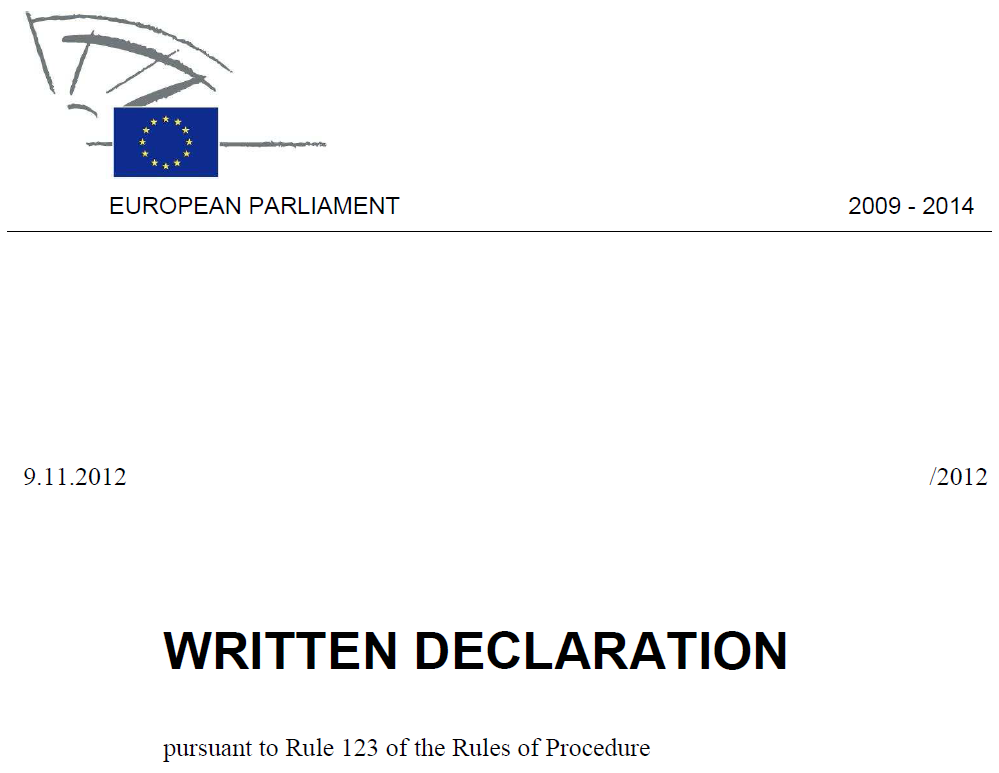The European Parliament’s rules of procedure regulating written declarations are under review. Written declarations are a way for Members of the European Parliament (MEPs) to initiate or reintroduce parliamentary discussion on a matter of common concern.
Current procedure
According to the current Rule 123, up to five MEPs may present a written declaration of no more than 200 words. After authorisation by the EP President, declarations are registered, distributed to MEPs and opened for their signature. In addition, written declarations are visible on the EP website.
The content of a declaration must fall within the competence of the EU and it cannot be on an issue subject to an ongoing legislative procedure. If a majority of MEPs sign the declaration within three months, it is published in the minutes of the sitting as an adopted text. A successful declaration is transmitted to the addressee(s). Typically this means the Commission and/or the Council. If a declaration fails to gain enough signatures after three months, it lapses. Declarations on combating corruption in European sports and on children with Down’s syndrome as well as on development education and active global citizenship are examples of adopted instruments.
Use of written declarations
According to an EP Policy Department study (2011) there has been an average of 75 written declarations per year in the current seventh legislature. Most declarations do not attain the required support. Since 2009 around 35% of them have been adopted. Although written declarations allow MEPs to raise awareness on a current topic, they have had only a limited impact in decision-making or agenda setting.
Besides examining written declarations in the EP, the study provides an overview of similar devices in other parliaments. Eight Member States have an equivalent procedure, although there are some differences, such as in follow-up procedures.
Main changes proposed
The report adopted in the AFCO Committee proposes several procedural changes. The major changes include the following. First, submitting a written declaration would require at least 10 MEPs from at least three political groups. A written declaration may not call for legislative action. Furthermore, it may not go beyond the form of a declaration, in particular not purport to take a decision covered by an existing procedure in the EP rules. Moreover, the report proposes to introduce an electronic register, which would allow MEPs to sign and withdraw their signature throughout the three-month period. A Member could not resign a declaration after withdrawal.
Furthermore, it would introduce a change in the follow-up rules. An adopted declaration could be placed on a committee’s agenda, if the institution to which it was addressed does not inform Parliament on its intended follow-up actions within three months.
Proposal for a new signature process
The report proposes a connection between the EP rules for written declarations and Rule 42 concerning Parliament’s right of initiative under Article 225 TFEU. Parliament may request the Commission to submit a proposal for an act by adopting a resolution based on an own-initiative report. The proposal suggests that in some cases a signature process similar to the one applied for written declarations could be used during this procedure. Any Member may table a proposal for an act, and gathering signatures would be a means to measure support.
The committee proposes that the impact of these new rules on the system of written declarations could be re-examined in the next (eighth) parliamentary term.








[…] the rules for written declarations. On average, MEPs hand in 75 written declarations per year. Our plenary briefing explained the proposed […]